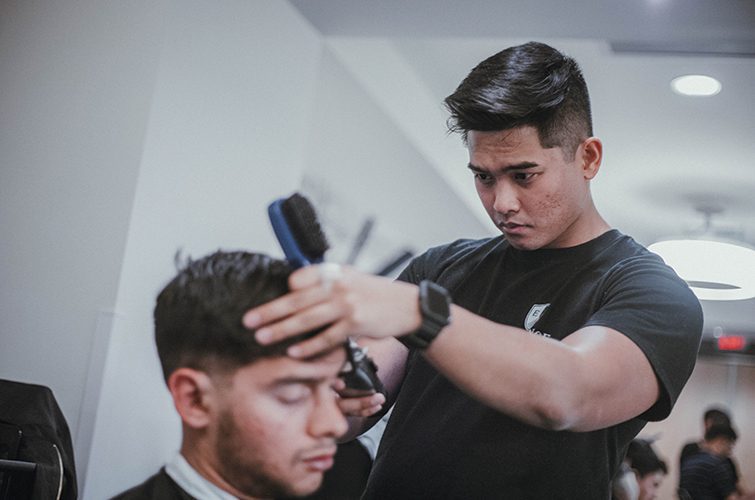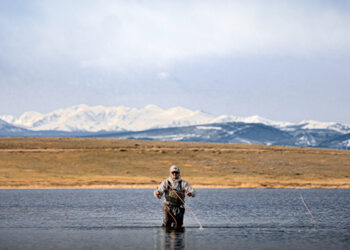Among the usual program offerings such as intramurals, club sports and fitness classes, there are many unique trends you can look to incorporate in your next school year. Here, campus rec professionals share the unique tournaments, well-being initiatives and events their departments are offering, along with advice on how to brainstorm new ideas.
Sailfish Cup Tournament
At Palm Beach Atlantic University (PBA), the most unique program offered through campus recreation is the Sailfish Cup Tournament, a tradition that’s been around for 25 years.
The tournament is a three-day competition offering over 200 head-to-head matchups in approximately 30 different categories ranging from cooking, chess, video games and flag football to fencing with pool noodles. Kerry Condon, the Campus Recreation coordinator, described the event as one of the largest for student involvement, with over 500 students typically competing.
“Students spend three days battling it out on a team created by their residence hall, all leading up to the most highly anticipated event of the weekend: the lip sync competition. Each team puts on a four-minute performance to a song that goes along with the story they are trying to tell,” said Condon. “By the end of these performances, the final scores are tallied, and the winners are announced and presented with the Sailfish Cup trophy that will have their team name added to the engraved plaque around the bottom.”
Condon’s team has found asking the student body what they want is the best way to provide programs and activities they want to engage in. Additionally, looking at what other schools offer helps provide inspiration for Condon’s team.
“We ask ourselves, ‘Can this be done at our university?’” said Condon. “‘Do we have the budget and resources to do something like this? Will our demographic of students engage in something like this? Would this program foster the integration of PBA’s core values?’ And we move forward from there.”
Thrive Well-Being Initiative
Wellness programs are one of the most popular trends in campus recreation. At Bowling Green State University (BGSU), the Recreation and Wellness team created “Thrive,” a campus-wide, comprehensive, well-being initiative to provide fundamental life skills, resources and support to enhance the welfare of the campus community through the eight dimensions of well-being: physical, social, environmental, intellectual, emotional, spiritual, occupational and financial.
Unique aspects of the Thrive initiative include educational sessions facilitated by the Counseling Center and Wellness Connection Peer Health Educators to cover topics such as nutrition, healthy relationships, exercise is medicine and stress survival, a four-week mindfulness workshop, a virtual book discussion group, and self-care events with aromatherapy, coloring and crafts, chair massage, and gentle yoga.
“The Thrive program is growing as we are planning for the future,” said Stephen Kampf, the director for Recreation and Wellness at BGSU. “We are currently discussing how to develop a color-coded map of the campus outlining the eight dimensions of well-being, and where on campus people can help improve one or more of the eight dimensions.
When deciding to offer a new program, Kampf elaborated it’s important to know the mission and strategic plan of your institution and attempt to determine how your program contributes to each. “Once we get an idea, small groups are formed and meet weekly, or twice a month, to brainstorm,” he said. “Once the ideas are discussed, we create a plan of action.”
Intentional Events
After receiving feedback that some females liked the idea of working out when there were no males around, Campus Recreation at California Baptist University (CBU) decided to create an event at the start of each semester called Ladies’ Night.
For the males on campus, feedback was received stating they preferred to have females still in the facility, so the Men’s Health Event, open to everyone, was also created. “It actually allows ladies who have a male in their circle of influence to get information for them and share it,” said Stefani Plummer, the director of the Student Recreation Center at CBU.
Plummer described both events as pretty similar, though the Ladies’ Night is larger.
Ladies’ Night
- The rec center is closed to men for three hours.
- Specialty fitness classes are offered, such as glow cycle, and instructors are brought in to teach things not already offered.
- Beauty treatments include haircuts, eyebrow threading, facials, make-up demos, manicures and henna.
- Collaboration with clubs on campus.
- A resource fair provides tables from different departments and local nutrition shops.
- Competitive relays like fitness relays or Ninja Warrior courses.
- Self-defense.
- Collaboration with food service providers for protein clusters and acai bowls.
- A fun giveaway through collaboration with associated students.
- An assessment with an incentive gift.
Men’s Health Event
- The rec center remains open to all.
- It’s the same as Ladies’ Night in terms of classes and the resource fair.
- Haircuts are offered.
- Local nutrition shops are brought in.
- Treats are provided.
- Competitive events.
- Assessment with a meal voucher incentive.
Plummer also elaborated on the variety of resource fair offerings, including a how-to budget lesson with Financial Services, a fashion show on professional attire with Career Services, breast health information supplied by the College of Nursing and insight on mental health awareness with the Counseling Center.

Additionally, student clubs are invited to events such as Car Club, STEM Girls, Women in Engineering, Nutrition Club and Art Therapy Club. Plummer shared they have plans to partner with Art Therapy and a local coffee shop to host a paint party called “Coffee & Canvas.”
Some of the other local vendors who are brought in to participate are Nutrishop, which brings an InBody scale and gives out BCAA samples; Cryofix Wellness offers a thumper gun and compression boots for muscle recovery; and a local Rape Crisis Center talks about self-defense in partnership with the self-defense program on campus.
At the end of each event, participants complete an assessment to give staff feedback. “We take our learning outcomes and make sure we are intentional with what we put out there,” said Plummer. “Every resource table has to be engaging, educational and intentional.”
When it comes to creating and hosting these events, Plummer shared intentional programming is key. “We can’t meet everyone’s needs with every program we do, but listening to what students want and trying to meet that is part of the fun,” she said.










